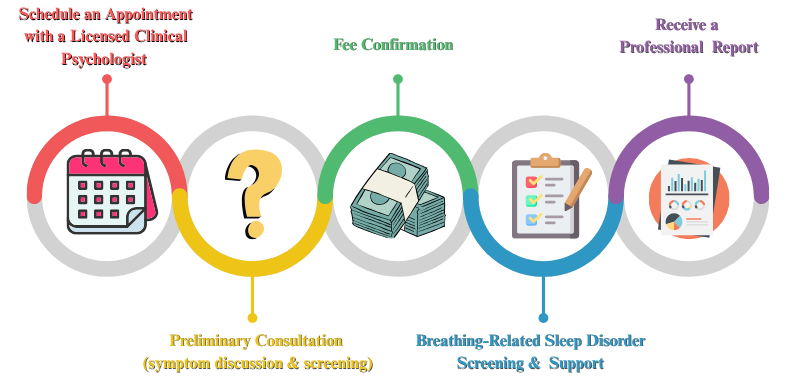13-9, 2 Rio Tower, Persiaran Rio, Bandar Puteri, 47100 Puchong, Selangor, Malaysia.
Breathing-Related Sleep Disorder
Understanding and Managing Sleep-Related Breathing Problems
Breathing-related sleep disorders are often linked to subtle or unnoticed changes in the way someone breathes during sleep. These changes can quietly affect oxygen levels, disrupt natural sleep cycles, and reduce the restorative quality of rest. Because they happen during sleep, they often go unnoticed unless observed by a bed partner or identified through professional screening.
At Skybi, we provide initial screening and tailored strategies as part of the management of sleep disorder, helping you recognise breathing-related issues, understand their impact, and take steps toward better rest and daily functioning. While some cases may require hospital-based sleep studies for formal diagnosis, we can help you start the process and guide you on the next steps.
What is a Breathing-Related Sleep Disorder?
A group of conditions that cause abnormal breathing patterns during sleep — such as pauses, shallow breathing, or airway obstruction — which can lead to fragmented sleep and long-term health effects.
Symptoms of Breathing-Related Sleep Disorder
Recognising the signs early is an important step in the management of sleep disorder. Here are some of the common symptoms people may notice, either themselves or through observations from a partner.
Breathing may stop for several seconds or even a minute, often observed by a bed partner. These pauses disrupt sleep quality and oxygen supply.
Sudden awakenings with a sensation of choking or struggling to breathe, often due to temporary airway blockage.
Common in mouth-breathers or those with nasal obstruction, often linked to sleep apnea-related mouth breathing.
Also known as nocturia — disrupted sleep and changes in oxygen levels can alter hormone regulation, increasing nighttime urination.
Reduced oxygen supply and interrupted sleep may cause mood instability, irritability, and fatigue — even after a “full” night in bed.
How Might It Affect Your Daily Life?
Breathing-related sleep disorders can influence your health, focus, and daily activities:
- Sleep Disruption — Partner’s rest disturbed by snoring, gasping, or movement.
- Alertness — Difficulty concentrating during important conversations or tasks.
- Travel Hesitation — Avoiding shared sleeping arrangements due to symptoms.
- Health Risks — Long-term issues such as high blood pressure or cardiovascular strain.
🔊
Sleep Disruption
Partner’s sleep disturbed by frequent sounds or movements
🧠
Low Alertness
Struggles with alertness during important conversations
🛌
Travel Hesitation
Hesitation to travel or sleep in shared accommodations
💊
Health Risks
Long-term health concerns like high blood pressure
Addressing these issues is a key part of the management of sleep disorder, helping improve both rest and overall health.
Next Steps When Symptoms Are Present
Poor sleep isn’t always caused by stress or lifestyle — sometimes, it’s due to physical changes in breathing during the night. These issues can quietly affect your rest and health for years if left unaddressed.
At Skybi, our mental health professionals can help you explore breathing-related sleep concerns through structured interviews and validated screening tools. While a formal diagnosis may require a hospital sleep study, we can help you:
- Identify possible breathing-related sleep disorder symptoms
- Understand their impact on your wellbeing
- Develop a personalised plan for the management of sleep disorder
- Connect with specialist care if further medical testing is needed
Here’s How You can Start?

Note: If a formal diagnosis is needed, your clinical psychologist may refer you to a hospital sleep clinic for further testing.
💬 Still unsure if you should get screened?
Contact us at Skybi and let our team help you take the first step toward better clarity and support.
🔗 Learn more :
You can also explore our pages on Insomnia, Narcolepsy and Parasomnias to see other ways we support the management of sleep disorder.




